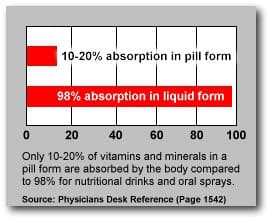
Why take liquid vitamins? On paper, pills sound like a much better idea — more convenient, more product choices, with a longer, more established product history. At first glance, there isn’t much of an argument for switching over to liquids.
But appearances don’t always equal reality. Liquid vitamins offer a number of potentially significant advantages that deserve serious consideration. Here’s a rundown on three of the biggest ones:
Benefits of liquid vitamins
1. Convenience. This one sounds counter-intuitive, right? After all, what could be easier than taking a pill, safe and secure in the knowledge that it gives you a full day’s complement of vitamins and minerals?
Well, it turns out that for some folks its not so easy. We all know people who don’t like taking pills, but in some instances swallowing a pill is more than just inconvenient. Pills can get stuck in the esophagus, or cause an irritation that produces a choking sensation. If severe enough, this problem can require immediate intervention (i.e., the Heimlich maneuver) and medical attention.
Compared to that possibility, liquid vitamins start to sound a lot easer and safer. The can be taken straight, by the capful, according to the recommended dosage. And if you don’t like the flavor, liquid vitamins can be added to juices, smoothies, milk and the like to make the taste more palatable.
2. The Big Lie. Quiz time: When you down your daily vitamin in pill form, you can go about your day safe and secure that you’ve attained nutritional completeness on the vitamin front, right? Wrong!

When it comes to vitamins in pill form, nutritional regulation is a bit like justice in the old West — i.e., way too haphazard and random. Unlike prescription and over-the-counter drugs, vitamins are largely unregulated, with no rules that require regular testing by a qualified government agency. Knowing what’s actually in the bottle can be a roll of the dice, because in numerous studies by the FDA and other consumer test organizations the percentage numbers have come up far short of what these companies tell you you’re getting when you swallow that convenient little pill.
Liquid vitamins, by contrast, are often designed and manufactured by smaller companies that are far more holistic in nature. Their corporate lives often depend on being able to give consumers exactly what they say is in the product., along with plenty of “extras.” And it turns out that those extras often represent another big advantage of liquid vitamins.
3. Versatility. To demonstrate how this one works, try this little experiment: go to a grocery store or a drug store, pick up three or more commonly found multivitamins and check out the ingredients. Chances are you won’t find a lot of differences, just marketing to highlight a particular health benefit that that company is touting.
Now try that same experiment in a grocery store or health food store that carries several brands of liquid vitamins. The ingredient choices will be all over the map. So, just to play out the experiment, jot down some of those ingredients that aren’t in multivitamins, and research their health benefits.
What you find out may surprise you. Many liquid vitamins contain ingredients address health issues and problems that a common multivitamin simply can’t take on. And millions of consumers have experienced the benefits of these ingredients, to the point where many of them swear by liquid vitamins.
And that’s why you should check out liquid vitamins: because if you give them a try, you may, too.











